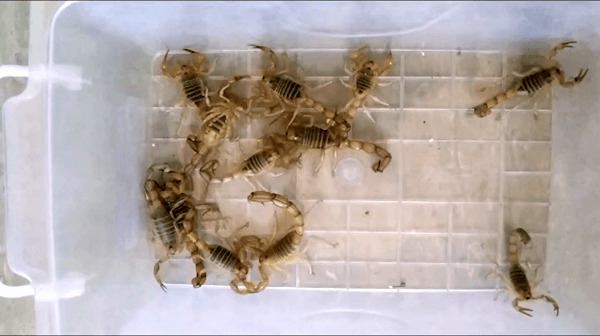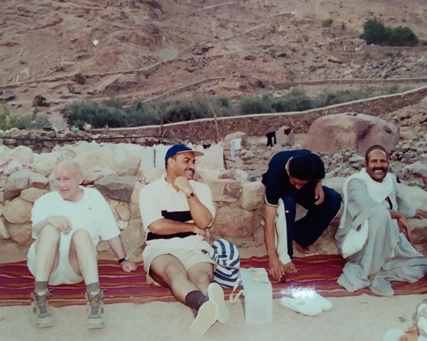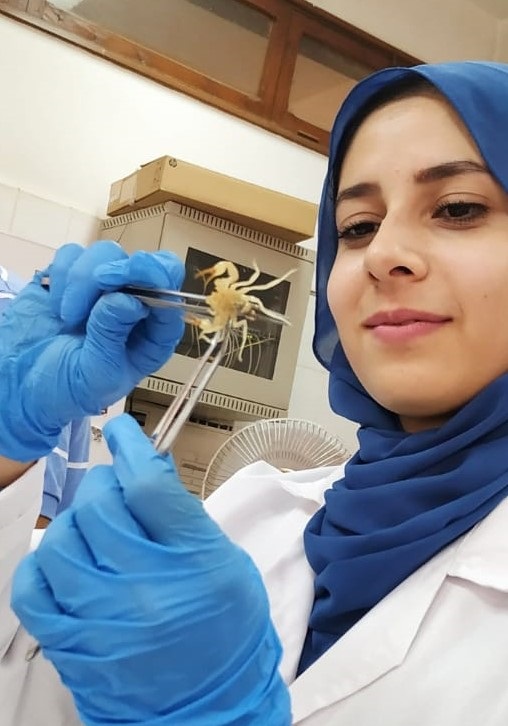Daniel Turnberg Travel Fellowship awardee Dr Mohamed A. Abdel-Rahman explains his work.
Many scientists try to design drugs in the laboratory or through computer programmes. But we’re searching for new drugs in the venom of snakes and scorpions.
My name is Dr Mohamed A. Abdel-Rahman, and I’ve worked with venomous animals in Egypt for over twenty years. I’m now an Associate Professor at Suez Canal University, and my research group is very interested in the uses of natural toxins.
Venoms are more complicated and powerful than we realise. They can kill bacteria and viruses, work as diagnostic and therapeutic agents of cancer, act as powerful insecticides and even supply pain relief.
 Newly caught scorpions © Dr Mohamed A. Abdel-Rahman
Newly caught scorpions © Dr Mohamed A. Abdel-Rahman
We collect the venom from local scorpions and snakes that we catch ourselves. Scorpions are nocturnal animals, so it’s better to wait until after the sun sets. Then we drive out west into the Sinai desert, and get out the UV lamps. Because scorpions’ bodies glow bright blue-green under UV light, we can hunt them very easily, especially on moonless nights.
 My first ever field trip collecting scorpions in 2001 in Wadi Al Arbaeen in St Catherine protectorate, South Sinai (just north of Sharm el Sheikh). I'm second from the left sitting next to my PhD supervisor. © Dr Mohamed A. Abdel-Rahman
My first ever field trip collecting scorpions in 2001 in Wadi Al Arbaeen in St Catherine protectorate, South Sinai (just north of Sharm el Sheikh). I'm second from the left sitting next to my PhD supervisor. © Dr Mohamed A. Abdel-Rahman
Back at the lab, we milk the venom using a range of methods. For example with scorpions, we pass electricity through the venom gland in the spike at the end of the tail. With snakes, we use mechanical stimulation instead – we trick the snakes into biting a rubber bung and drain out the venom in a container.
The venom from these animals is a powerful biological cocktail. We have to isolate each protein using sophisticated profiling techniques called venomics and test their properties individually. I started the experimental work characterising these peptides with colleagues at Sheffield Hallam University in 2012, thanks to the Academy’s Daniel Turnberg Travel Fellowship. We’ve continued the collaboration, and supported three Egyptian and British students to get their PhD degrees on this work, with another Egyptian PhD student out working in Sheffield now.

One of my PhD students handling our scorprons © Dr Mohamed A. Abdel-Rahman
Today, I focus on the Egyptian Scorpion, Scorpio maurus palmatus. With colleagues in Mexico, Japan and Egypt, I investigated one of the peptides we isolated from this species, called Smp76. In the laboratory, we found Smp76 was able to protect cells from hepatitis C virus infection, and it also killed dengue virus. We have obtained a patent on this peptide and clinical trials will start shortly.
Venom research is a relatively neglected area, and we should do more to understand the potential of these naturally occurring drugs. I want to thank the Academy of Medical Sciences and the Turnberg family for supporting us. Hopefully one day research with the native animals of countries like Egypt can benefit people around the world.
-------
Dr Mohamed A. Abdel-Rahman is Associate Professor of Toxinology and Physiology at Suez Canal University, Egypt. He won a Daniel Turnberg Travel Fellowship in 2012 to work at Sheffield Hallam University. Read more about the most recent Turnberg Alumni conference in 2019, where we spoke with Mohamed.
The Daniel Turnberg Travel Fellowship programme has supported over 270 UK-Middle East exchange visits over the last ten years. This work is generously supported by the Daniel Turnberg Memorial Fund.